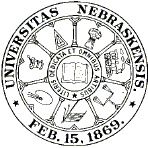
University Studies (University of Nebraska) (1888–1984)
Date of this Version
3-1958
Citation
University of Nebraska Studies: New Series no. 19
Abstract
One of the most remarkable phenomena in the literary world of the present century has been the revolution in taste accomplished by what has come to be known as "the new criticism." While 1. A. Richards is sometimes looked upon as the founder of this movement, I purpose to show that the imagists were its real founders. The imagists and the school of Richards may, of course, be treated as separate schools. But they may also be regarded, as I propose to regard them, as different phases of the same basic movement.
To include the imagists under the new criticism may seem to complicate the task of defining it. This is no doubt so if we conceive of the new criticism as the common denominator in the ideas of a particular group of men. But if we seek such a common denominator we may find ourselves eliminating the most revealing aspects of our subject. We should have to eliminate, for instance, Richards' emotive-cognitive dichotomy on the ground that no other new critic endorses this particular distinction between poetry and science. Yet Richards' doctrine is certainly of the essence of our subject and cannot be eliminated. In other words, the new criticism is not a set of doctrines shared by a group of men. It is rather the evolution of a problem.
One thing evident about this problem is that it has had to do with the nature of poetic diction. "We are witnessing in America today," wrote Allen Tate in 1942, "an exhaustive study of poetic language such as Criticism has not attempted either here or in Europe in any previous age."! Tate's remark agrees with a more recent one by Cleanth Brooks: "The rise of modern criticism is part of a general intensification of the study of language and symbolism." 2 Their central concern with language, however, is not only acknowledged by the new critics themselves; it is also pointed out by their principal contemporary adversaries, the Neo-Aristotelians. Thus the general objection that R. S. Crane and Elder Olson raise against the new criticism is that it attempts to confine the investigation of poetry to the question of its medium alone.
In one sense of the word, every revolution in the theory of poetic diction is the same revolution: that is, it represents an effort to adapt the language of poetry to the current idiom. F. W. Bateson goes so far as to contend that linguistic changes constitute the only direct influence of an age upon its poetry.4 Such a view is unacceptable because it disregards what Austin Warren and Rene Wellek have called the dialectical relation between language and literature.:> Poetry influences the development of language-a fact that Bateson ignores. But Bateson is no doubt right in suggesting that an accumulation of changes in the spoken language tends to produce a new style of poetry and a new theory of poetic diction.


Comments
Published by The University at Lincoln